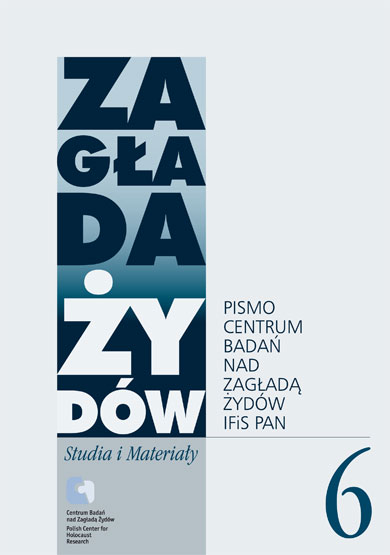Lagry w perspektywie genderowej
Zagłada Żydów. Studia i Materiały, Nr 6 (2010), Strony: 193-204
Data zgłoszenia: 2020-12-06Data publikacji: 2010-12-30
 https://doi.org/10.32927/zzsim.716
https://doi.org/10.32927/zzsim.716
Abstrakt
The questions of corporality, sexuality, women’s experience and their record examined in the context of camp issues and the Holocaust have only recently become the subject of attention. Gender studies play a significant role in the discussion on those issues. Existing works on the subject (i.a. the book of Bożena Karwowska Ciało. Seksualność. Obozy zagłady [Gender, Sexuality, Concentration Camps]) show that the tools of gender studies are cognitively useful, but, as it appears, their role of being particularly predestined to uncover what is marginalized or condemned to silence is overestimated. Nevertheless, apart from the dominance of the patriarchal discourse, there have always existed other reasons for suppressing the matter of corporality and sexuality both in works on KL’s and in science; social taboo (controlled not only by the male symbolical order) as well as the policy (e.g. it was possible to
write openly about rape on former female prisoners by Soviet soldiers only after censorship had been lifted) play an important role here. The fundamental value of the gender perspective lies in the firm approach towards the issues hitherto marginalized in the KL context – both by science and, to a lesser extent, literature (which is reflected by i.a. works of Pankowski and Posmysz published years ago).
Licencja
Prawa autorskie (c) 2010 Autor & "Zagłada Żydów. Studia i Materiały"

Utwór dostępny jest na licencji Creative Commons Uznanie autorstwa 4.0 Międzynarodowe.
https://creativecommons.org/licenses/by/4.0
Podobne artykuły
- Maciej Janowski, Polskie obozy śmierci i polskie dobre imię , Zagłada Żydów. Studia i Materiały: Nr 14 (2018)
- Jacek Leociak, Rachel Brenner, The Ethics of Witnessing. The Holocaust in Polish Writers’ Diaries from Warsaw, 1939–1945 , Zagłada Żydów. Studia i Materiały: Nr 11 (2015)
- Redakcja Czasopisma, Jan Grabowski, From the editors , Zagłada Żydów. Studia i Materiały: 2010: Holocaust Studies and Materials
- Jacek Leociak, Ginczanka , Zagłada Żydów. Studia i Materiały: Nr 11 (2015)
- Jacek Leociak, Literature of the Personal Document as a Source in Holocaust Research (a Methodological Reconnaissance). , Zagłada Żydów. Studia i Materiały: 2008: Holocaust Studies and Materials
- Marta Janczewska, O śmierci w niemieckim języku oficjalnym na przykładzie raportu Jürgena Stroopa , Zagłada Żydów. Studia i Materiały: Nr 12 (2016)
- Jacek Leociak, Ruta Sakowska (1922–2011) , Zagłada Żydów. Studia i Materiały: Nr 7 (2011)
- Jacek Leociak, Anna Ziębińska-Witek, Historia w muzeach. Studium ekspozycji Holokaustu , Zagłada Żydów. Studia i Materiały: Nr 9 (2013)
- Jacek Leociak, „…rozmawiałem z Bogiem (uśmiechacie się! tylko z nim mogę jeszcze rozmawiać!)”. Modlitewne lamentacje w pamiętniku Karola Rotgebera z getta warszawskiego , Zagłada Żydów. Studia i Materiały: Nr 15 (2019)
- Jacek Leociak, Marta Tomczok, Afektywny kicz holokaustowy – wprowadzenie , Zagłada Żydów. Studia i Materiały: Nr 17 (2021)
<< < 1 2 3 4 5 6 7 8 9 10 11 12 13 14 15 16 17 18 19 20 21 22 23 > >>
Możesz również Rozpocznij zaawansowane wyszukiwanie podobieństw dla tego artykułu.
 English
English
 Język Polski
Język Polski








